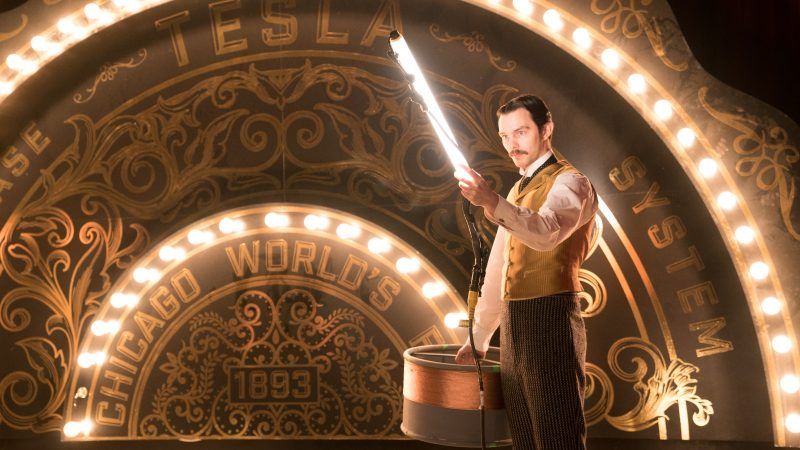Review: The Current War: Director's Cut
Lighting up with Benedict Cumberbatch and Michael Shannon.

The Current War is an elegantly made movie about the late-19th Century battle between Thomas Edison and George Westinghouse to be the first to light up America with electrical power. As you might remember—no dozing! —Edison was the champion of direct current (DC), while Westinghouse promoted the riskier but cheaper alternating current (AC). The movie—no yawning either! —stirs this dry subject to life with a lean script by Michael Mitnick, rich production design by Jan Roelfs, deftly organized cinematography by Chung Chung-hoon, and a strong cast that includes Benedict Cumberbatch as Edison and Michael Shannon as Westinghouse. It's not like homework, in other words. But it is a picture that was shot in 2016, so why is it just now reaching us?
The Current War actually premiered at the 2017 Toronto International Film Festival, in an unfinished form that the director, Alfonso Gomez-Rejon, openly disliked, as did most everybody else. In subsequent interviews, Gomez-Rejon blamed that bad cut of the movie on famously meddlesome producer Harvey Weinstein, who later reedited the whole film without the director's knowledge. This Weinstein problem eventually disappeared amid the uproar over revelations about his long history of sexual loutishness, but his toppling left Gomez-Rejon's movie homeless.
Eventually—be patient! —Martin Scorsese stepped in. Gomez-Rejon had worked for Scorsese as a personal assistant and second-unit director, and the older filmmaker's intercession at this point won his protégé time for further shooting and other useful tinkerings. So now the movie is finally getting a full release, this time with an emphatic subtitle: "Director's Cut."
The picture is somewhat old-fashioned, but not in a fuddy-duddy way. It offers a burnished depiction of life before electric light—a world of candles and oil lamps softly illuminating the heavy mahogany furniture and brocade curtains of the period. We see the contrast with the world that is soon to come in the opening scene, set on a snowy night in 1880. A train pulls up through the flurries and a group of wealthy men in top hats debarks. They make their way to a nearby field, which is ablaze with light from scores of incandescent bulbs affixed to poles. Thomas Edison, showman and inventor, always in search of financing, is waiting for them. "I hope you brought your checkbooks," he tells his guests.
The movie portrays Edison as an idealist (he refuses to work on any project intended to take human lives), but one who makes occasional visits to the dark side. Cumberbatch underplays this latter aspect of the man's nature, but it's clear enough in the occasional chilly set of his features, and in scenes like the one in which Edison tries to demonstrate the danger of Westinghouse's higher-voltage AC current by using it to publicly execute a horse. (Edison later staged the public execution of an elephant, and later still schemed to blacken AC's image by arranging to have it used to power the first electric chair.)
Shannon's George Westinghouse is—stop fidgeting! —Edison's opposite. Already wealthy from his invention of railway air brakes, Westinghouse believes that every man should endeavor to leave the world a better place than he found it, and he wants to partner with Edison to forge the country's electrical future. Edison, a stranger to charm, rudely rebuffs him.
Orbiting these two are a pair of wives (minimally utilized Tuppence Middleton and Katherine Waterston), the moneybags investor J.P. Morgan (Matthew Macfadyen), Edison's peppy aide-de-camp Samuel Insull (Tom Holland), and a brilliant young Serb immigrant named Nikola Tesla (Nicholas Hoult), who's already employed in Edison's European operation. Tesla has a track record in wireless and X-ray technology, and he is transfixed (briefly) by Edison's entrepreneurial brilliance. "We make a minor invention every 10 days," Edison tells him, "and a major one every six months or so." Bringing him aboard, the great man offers Tesla a derisory starting wage, but promises a $50,000 bonus if he proves worthy. Edison being a man of many surprises, this turns out to be a bald lie.
Normally, a movie about electrical science, if that's what it's called, might be a trudge, and The Current War isn't any kind of action movie. But Gomez-Rejon holds our interest in these two differently-gifted characters, who are standing on the brink of an enormous social change. In some scenes, he's even able to conjure a bit of the awe that people must have felt in that age of wizards and wonders. Addressing a crowd at the New York Stock Exchange in 1882, as he's about to flip a switch and light the place up, Edison says, "My boys and I caught in a jar what before now has only flashed across the night sky." Thanks, Tom.
